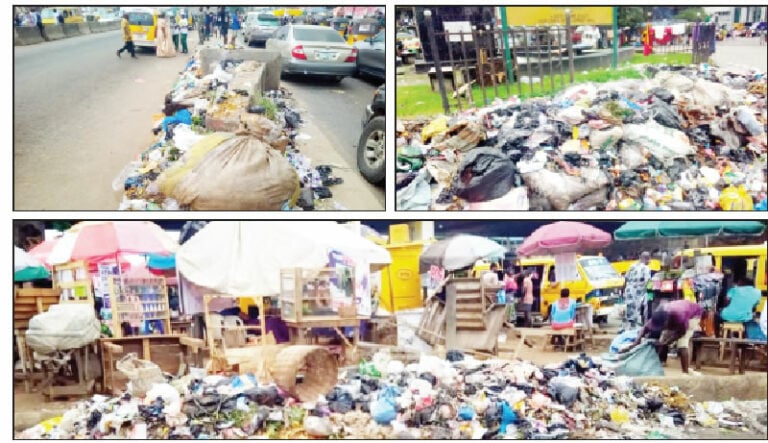Residents across Lagos have raised concerns about potential disease outbreaks as piles of refuse continue to accumulate on major roads throughout the state.

From Iyana-Ipaja and Abule Egba to Oshodi, Iyana-Iba, Isheri-Jakande, Agege, and parts of Lagos Island, heaps of waste have become a recurring sight, causing discomfort and health worries among locals.
Kunle Ayeni, a resident of Igando, told PUNCH Metro that the situation has persisted for over three months without any visible intervention from waste management authorities. “The smell is terrible, especially when it rains. Flies are everywhere, and sometimes we can’t even open our windows. We’ve reported to the PSP office, but nothing has been done,” he said.
Similarly, Deola Davies, living along Isheri-Jakande Road, expressed frustration over the lack of government attention. “People dump refuse on the median, and PSP operators leave it there. What’s left for us is to inhale the stench. Those parts of the roads now stink,” she noted.

Funmi Adagba added that some refuse piles remain on roads for nearly two weeks before being cleared. Residents attribute the worsening situation to the inefficiency of waste management operators, despite regular payments to Private Sector Participants (PSP).
In Shibiri, Ojo, Esther Owobayi said refuse collection now occurs only once a month, even though residents pay monthly fees. Funmilayo Ojo blamed weak enforcement and poor monitoring for the crisis, noting that PSP operators often ignore complaints.
Traders at Oshodi Market continue to operate amid heaps of refuse. Kudirat Bose explained, “We endure the smell because there’s no other space to sell. The waste trucks aren’t enough to carry the daily refuse.” Chioma Nwachukwu urged the government to provide more mini-trucks for collection.

In Ajao Estate, Lawal Ishola reported that the refuse outside his house had not been collected for over three weeks. At Ekoro Road in Abule Egba, plastic bottles, vegetable remains, and nylon waste created buzzing heaps of garbage. Traders said that even after cleanup, the refuse quickly returns.
Tosin Akintunde blamed high waste collection charges for indiscriminate dumping. On Lagos Island, a large heap at the roundabout leading to Tafawa Balewa Square had spread onto the road within hours, forcing traders to continue business beside it.
The Lagos State Ministry of Environment and Water Resources, however, cited residents’ unwillingness to pay for waste disposal services as a key factor. Ministry spokesperson Kunle Adeshina said the state has over 100 waste collection trucks, but arrears and default in payments by residents hinder operations.
Adeshina added that residents often dump refuse at odd hours, relying on LAWMA to clean it up. “Many households owe PSP operators up to six months in arrears, making it difficult to sustain operations,” he explained.

The ministry has intensified enforcement through its community waste policing system, holding property owners accountable for refuse dumped on their premises.
Environmental health experts warn that prolonged accumulation of waste could trigger outbreaks of diseases such as cholera and dysentery if the situation is not promptly addressed.



